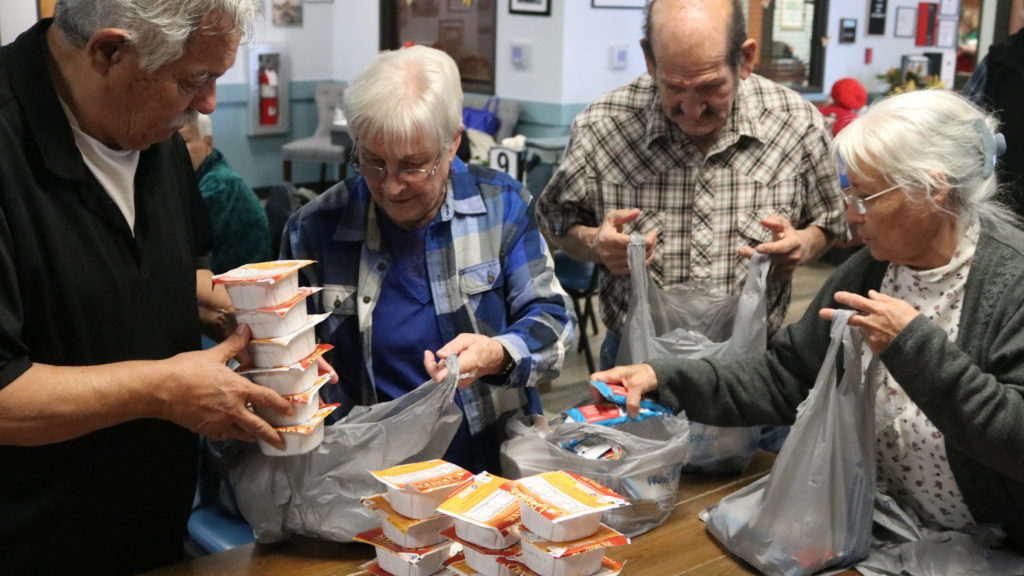
The Covid 19 pandemic created some issues, but it also shed light on some problems that already existed. One such problem is senior adult hunger. Texas is in the top ten states with the highest rate of senior hunger.
In response to Covid related unemployment, the United States Department of Agriculture (USDA) quickly moved into action increasing SNAP (Supplemental Nutrition Assistance Program) benefits for families. Increases have continued every few months well into 2022.
Few senior adults qualified for SNAP prior to 2020, however. In fact, in 2019, 45% of seniors on fixed incomes were already living at or above the federal poverty level. Many times faced with the choice of buying food or paying for necessary medications, health related costs win out.
“Senior adult hunger is often a hidden problem,” Good Samaritan Ministries Executive Director Leesa Stephens said. “When senior centers are open daily for lunch and churches have weekly meals, it helps those struggling financially to have at least one meal a day. The pandemic shut many of these type of programs down for several months.”
“We took care of everyone through drive through and never missed a beat there, no one ever did without food,” Brownwood Senior Citizens Center Program Director Angie Dees said. “We also continued our home delivery and that never stopped. When we came back, we did a big giveaway to get people back in a routine and our neighbors were really high, but then the second variant came around. When it did, it scared everybody again. But slowly but surely people started to treat at is ‘we’re done with this’ and they started coming back. We’re doing really well, serving anywhere from 110 to 150, and 160 were here for Thanksgiving. And it’s not just a place for them to eat anymore, they have activities every day.”
One of Good Samaritan’s seven hunger relief programs is the Homebound Program. This partnership with home health agencies and Adult Protective Services works to identifying and serve senior adults in danger of malnutrition.
“Prior to the Covid, home health nurses and aides would recognize which clients needed food, and would pick that up for them at our Food Pantry,” Stephens said. “Several of those in-person services stopped during the pandemic or switched to a telehealth model. As a result, some of our homebound clients did not have someone checking on them regularly in their homes. These folks slipped through the cracks.”
As the pandemic lingered, the USDA added more federal funding for nutrition programs. The Brownwood Senior Center was able to receive a grant that provided a month’s work of breakfast items for their clients who received hot meal delivery.
“We were providing breakfast through our grant money from the state,” Dees said. “They had a lot of money left over so we did breakfast from June until the end of September. At the end of September, after we provided them with more food, I didn’t want to take that food away from them. It was crushing me. I started looking for grants and seeing what was out there.”
By summer 2022, Covid aid programs were being defunded or discontinued. Funding for the Center’s breakfast packs ended. Dees wanted to continue what she believes is a beneficial program for her clients, so she reached out to Good Samaritan to see if a partnership could be formed.
“We had already had a partnership with Good Samaritan providing boxes of food to our clients each month,” Dees said. “A lot of the people we deliver meals to, Good Samaritan had lost contact with. Now they can get on the program with Leesa, we pick up the box of food for them and then disperse that out to just our clients.”
Good Samaritan agreed to fund the breakfast program for October, November and December to give Dees and her staff time to seek other funding.
“Angie Dees is such an advocate for the people the Center serves. We already partner with them to provide monthly food boxes through our Mobile Food Pantry program,” Stephens said. “Adding breakfast bags is just a natural extension of what we were already doing.”
Securing food for the Homebound Program had prepared GSM for some ideas of what foods to include.
“The clients we serve through our Homebound Program need the nutritional support, but they often don’t have the energy or desire to prepare meals,” Stephens said. “They also don’t need items in large quantities that can spoil before they use it all. We know from experience that the tastier an item is and the easier a food item is to consume, the more likely it is that a homebound client will take advantage of it.”
Each bag contains a month’s worth of simple breakfast items. Bags include individual cereal bowls, Nutri-grain breakfast bars and shelf stable yogurt. Good Samaritan purchases the items and volunteers at the Senior Center bag them for delivery.
“We pick up the breakfast foods on Tuesday morning, then we bring it over here and on Wednesday morning our clients here volunteer and package all the breakfast food,”Dees said. “Then we send it out on Thursdays, one route a week.”
Good Samaritan will continue their role in the program through March.
“Fighting hunger and food insecurity is a large part of our mission” Stephens said. “We are glad to be back serving homebound senior adults that we may have missed these past few years. No one should be hungry in Brown County, Texas.”